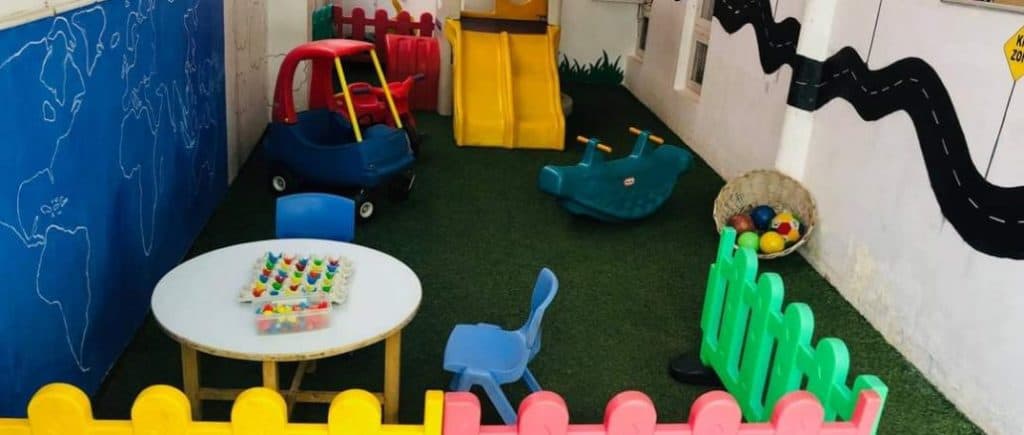The COVID-19 pandemic has pushed India’s evolving child-care ecosystem to the brink of collapse with preschools and playschools shuttered since March last year and no new admissions this academic year. According to a UNICEF report, this has impacted 28 million preschool children in anganwadi centres across the country. But while the Union Ministry of Women and Child Development issued an order in November last year, allowing all states and Union Territories to reopen anganwadis outside containment zones with immediate effect, there is still total confusion among parents, schools and policy makers on the reopening of private preschools.
Having seen thriving business pre-COVID, with pre-schools and day care centres mushrooming all over the capital, today many preschool owners have decided to look for other business avenues. In the National Capital Region (NCR), Arvind Bhasin, who runs the Vidyanjali chain of preschools, started a chain of grocery stores during the lockdown. All his 14 preschools, seven of them directly owned by him and the rest run under a franchise model, are currently shut.
The smaller playschool chains which were operating on razor-thin margins, have been the hardest hit by the closures. “Playschools in India mainly function out of rented premises,” said Bharat Kapoor, co-founder and managing director of Your Kids R Our Kids, a chain of 36 day care and education centres across the country. “With landlords refusing to renegotiate rent, there is a big debt problem for preschool owners. Even when the government allows preschools to reopen, where will they find the money to clear this debt? Which is why many think it’s best to pack up and leave.”
WhatsApp groups of preschool owners, said Kapoor, have been buzzing with alerts about closures, sale listings and takeover offers. “Over 20 preschool owners have approached me in recent weeks asking if I can take over their centres,” he said.
Read more: Preschools, daycares disappear into COVID gap; Govt indifferent
When schools resumed functioning, most of them continued with online classes and some playschools too switched to this mode. But as Shalini, who runs the Kidzz Play School and Day Care Centre in East Delhi’s Mayur Vihar, said: “We re-started in April this year with online classes. But the response has been very poor. Parents too are not very interested in getting their children to attend these classes. One reason is that the attention span of these children is very limited. Another problem for most of us running such schools is lack of finances”.
Online issues
Read more: Some dos and don’ts for parents as schools reopen
A gendered impact
Swati Popat Vats, the Mumbai-based president of the Early Childhood Association, a group of preschool and day care owners and experts, said the impact of closures in the preschool sector will be felt disproportionately by women. “What happens to mothers who will have to return to the workplace one day?” asked Swati. “How will they join the workforce again when their nearest day care centre or preschool is closed?”
Besides, this is a sector run predominantly by women. “Over 80% of preschools in the country are owned and run by women entrepreneurs”, added Swati. “Caregivers, teachers and helpers in a preschool are all usually women who will now be without jobs and income”.

Foundational learning being ignored
“There are two separate issues when it comes to private providers of early childhood education,” said Vrinda Datta, Director of the Centre for Early Childhood Education and Development at Ambedkar University in Delhi. “Poor quality early childhood programmes can be detrimental to children. So if the ones that are closing are the poor quality ones then it’s good. But having said that, a neighbourhood day care or preschool is beneficial to children. There are examples of well-run individual centres in Mumbai and Delhi. These are centres and programmes that we cannot afford to lose”.
In Delhi, there is wide variation and divergence in the existing system of pre-primary education. Firstly, hardly any of the full-fledged secondary and senior secondary schools offer uniform pre-primary education. While a majority of private schools in Delhi have pre-primary facility, only a few government schools do. Secondly, the duration of this stage of education varies from school to school. In government schools where this facility exists, pre-primary class is of only one year duration prior to class I, whereas in many private schools pre-primary consists of two or even three years variously known as LKG, UKG, Pre-nursery, Nursery, Preparatory and so on.
It is time that policy makers realise that the foundational learning of children needs a major revamp. Children should not be deprived of the stimulation they receive from their preschools or anganwadi centres.
“If much of the economy has opened up fully, why are we restricting the education sector?” asked Menka Sharma, director of Mother’s Arm International School, Delhi. “Is it because there is no GST on education? Playschools should unite and not wait for the education ministry to come up with an announcement. I have visited many preschools in UP and they are functional.”
While classes six and above have reopened largely with online classes, pre-schoolers have been totally ignored. But even where online classes are being experimented with even for early childhood learners, it is a challenge for parents who are feeling harried, having to take time off from work to be present with the kids while their classes are on. On the other hand, though medical opinion by and large is that young kids are relatively safe from the virus, parents remain understandably worried about sending their kids to pre-school even if they do finally open up.
** In the first published version of the article, it had been erroneously mentioned that Step By Step remains closed since March 2020. We regret and apologise for the unwitting error.
Mr. Krishna, please note that Step by Step is not closed and are taking classes online since March last year. My son is enrolled there.